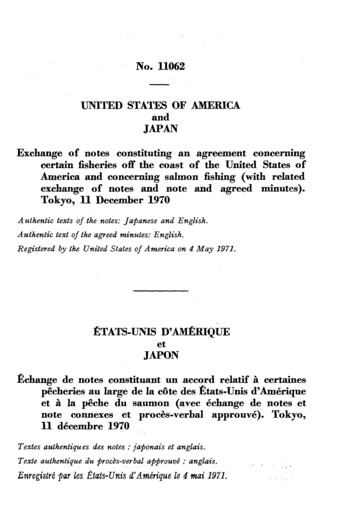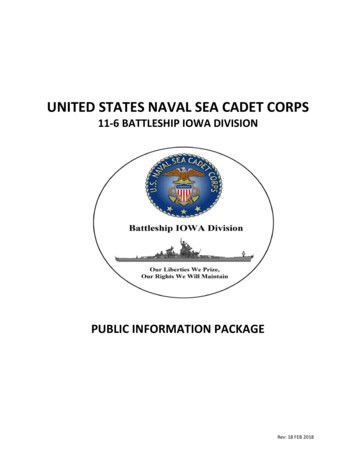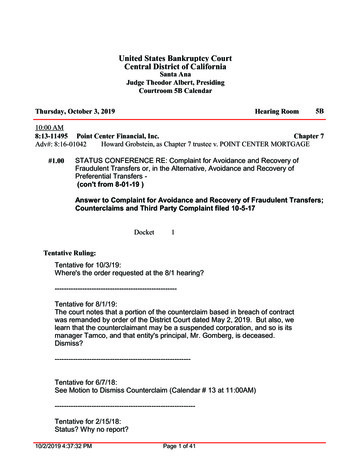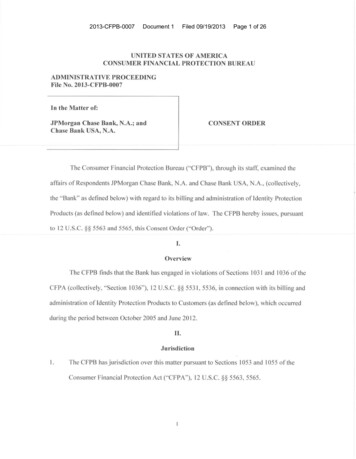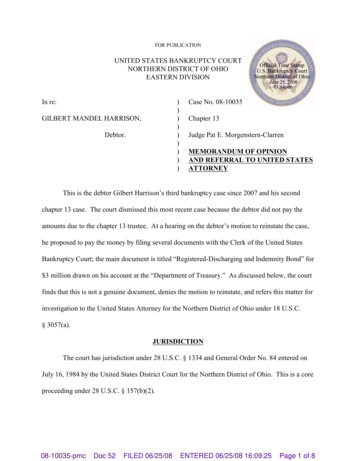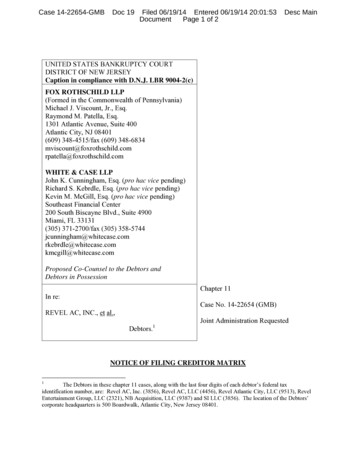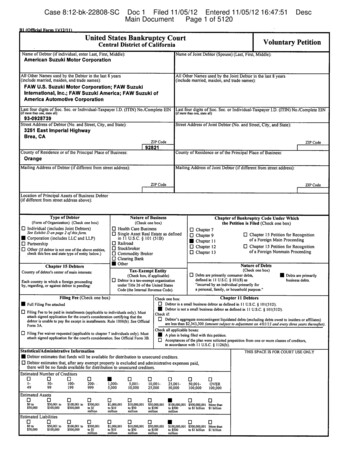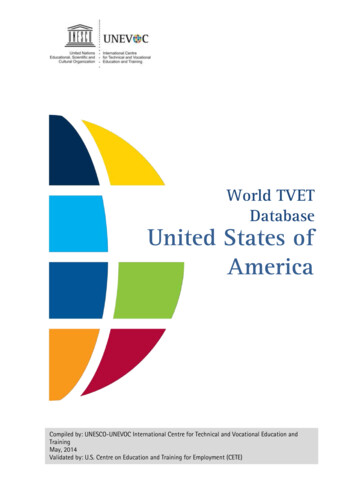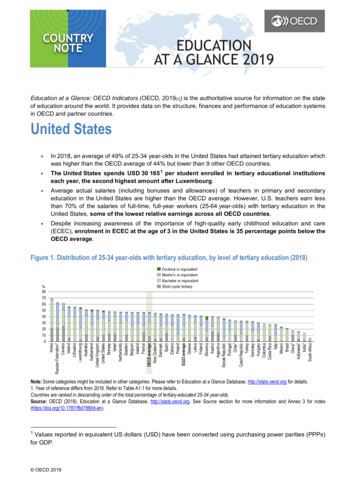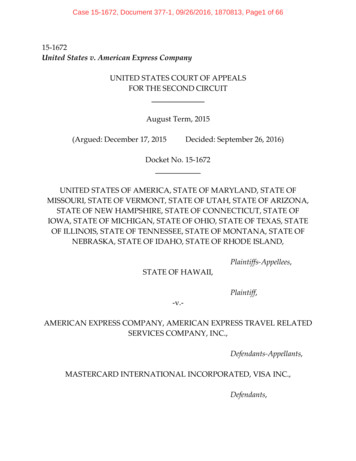
Transcription
Case 15-1672, Document 377-1, 09/26/2016, 1870813, Page1 of 6615‐1672United States v. American Express CompanyUNITED STATES COURT OF APPEALSFOR THE SECOND CIRCUITAugust Term, 2015(Argued: December 17, 2015Decided: September 26, 2016)Docket No. 15‐1672UNITED STATES OF AMERICA, STATE OF MARYLAND, STATE OFMISSOURI, STATE OF VERMONT, STATE OF UTAH, STATE OF ARIZONA,STATE OF NEW HAMPSHIRE, STATE OF CONNECTICUT, STATE OFIOWA, STATE OF MICHIGAN, STATE OF OHIO, STATE OF TEXAS, STATEOF ILLINOIS, STATE OF TENNESSEE, STATE OF MONTANA, STATE OFNEBRASKA, STATE OF IDAHO, STATE OF RHODE ISLAND,Plaintiffs‐Appellees,STATE OF HAWAII,Plaintiff,‐v.‐AMERICAN EXPRESS COMPANY, AMERICAN EXPRESS TRAVEL RELATEDSERVICES COMPANY, INC.,Defendants‐Appellants,MASTERCARD INTERNATIONAL INCORPORATED, VISA INC.,Defendants,
Case 15-1672, Document 377-1, 09/26/2016, 1870813, Page2 of 66CVS HEALTH, INC., MEIJER, INC., PUBLIX SUPER MARKETS, INC.,RALEY’S, SUPERVALU, INC., AHOLD U.S.A., INC., ALBERTSONS LLC,THE GREAT ATLANTIC & PACIFIC TEA COMPANY, INC., H.E. BUTTGROCERY CO., HYVEE, INC., THE KROGER CO., SAFEWAY INC.,WALGREEN CO., RITE‐AID CORP., BI‐LO LLC, HOME DEPOT USA, INC.,7‐ELEVEN, INC., ACADEMY, LTD., DBA ACADEMY SPORTS OUTDOORS, ALIMENTATION COUCHE‐TARD INC., AMAZON.COM, INC.,AMERICAN EAGLE OUTFITTERS, INC., ASHLEY FURNITUREINDUSTRIES INC., BARNES & NOBLE, INC., BARNES & NOBLECOLLEGE BOOKSELLERS, LLC, BEALL’S, INC., BEST BUY CO., INC.,BOSCOVS, INC., BROOKSHIRE GROCERY COMPANY, BUC‐EE’S LTD,THE BUCKLE, INC., THE CHILDRENS PLACE RETAIL STORES, INC.,COBORNS INCORPORATED, CRACKER BARREL OLD COUNTRY STORE,INC., D’AGOSTINO SUPERMARKETS, INC., DAVIDS BRIDAL, INC., DBD,INC., DAVIDS BRIDAL CANADA INC., DILLARD’S, INC., DRURY HOTELSCOMPANY, LLC, EXPRESS LLC, FLEET AND FARM OF GREEN BAY,FLEET WHOLESALE SUPPLY CO. INC., FOOT LOCKER, INC., THE GAP,INC., HMSHOST CORPORATION, IKEA NORTH AMERICA SERVICES,LLC, KWIK TRIP, INC., LOWE’S COMPANIES, INC., MARATHONPETROLEUM COMPANY LP, MARTIN’S SUPER MARKETS, INC.,MICHAELS STORES, INC., MILLS E‐COMMERCE ENTERPRISES, INC.,MILLS FLEET FARM, INC., MILLS MOTOR, INC., MILLS AUTOENTERPRISES, INC., WILLMAR MOTORS, LLC, MILLS AUTOENTERPRISES, INC., MILLS AUTO CENTER, INC., BRAINERD LIVELYAUTO, LLC, FLEET AND FARM OF MENOMONIE, INC., FLEET ANDFARM OF MANITOWOC, INC., FLEET AND FARM OF PLYMOUTH, INC.,FLEET AND FARM SUPPLY CO. OF WEST BEND, INC., FLEET AND FARMOF WAUPACA, INC., FLEET WHOLESALE SUPPLY OF FERGUS FALLS,INC., FLEET AND FARM OF ALEXANDRIA, INC., NATIONALASSOCIATION OF CONVENIENCE STORES, NATIONAL GROCERSASSOCIATION, NATIONAL RESTAURANT ASSOCIATION, OFFICIALPAYMENTS CORPORATION, PACIFIC SUNWEAR OF CALIFORNIA, INC.,P.C. RICHARD & SON, INC., PANDA RESTAURANT GROUP, INC.,PETSMART, INC., RACETRAC PETROLEUM, INC., RECREATIONALEQUIPMENT, INC., REPUBLIC SERVICES, INC., RETAIL INDUSTRYLEADERS ASSOCIATION, SEARS HOLDINGS CORPORATION,2
Case 15-1672, Document 377-1, 09/26/2016, 1870813, Page3 of 66SPEEDWAY LLC, STEIN MART, INC., SWAROVSKI U.S. HOLDINGLIMITED, WAL‐MART STORES INC., WHOLE FOODS MARKET GROUP,INC., WHOLE FOODS MARKET CALIFORNIA, INC., MRS. GOOCH’SNATURAL FOOD MARKETS, INC., WHOLE FOOD COMPANY, WHOLEFOODS MARKET PACIFIC NORTHWEST, INC., WFM‐WO, INC., WFMNORTHERN NEVADA, INC., WFM HAWAII, INC., WFM SOUTHERNNEVADA, INC., WHOLE FOODS MARKET, ROCKY MOUNTAIN/SOUTHWEST, L.P., THE WILLIAM CARTER COMPANY, YUM! BRANDS,INC., SOUTHWEST AIRLINES CO.Movants.Before:WINTER, WESLEY, and DRONEY, Circuit Judges.Appeal from a decision of the United States District Court for the EasternDistrict of New York (Garaufis, J.) dated February 19, 2015, finding thatAmerican Express (“Amex”) unreasonably restrained trade by entering intoagreements containing nondiscriminatory provisions (“NDPs”) barringmerchants from (1) offering cardholders any discounts or nonmonetaryincentives to use cards that are less costly for merchants to accept, (2) expressingpreferences for any card, or (3) disclosing information about the costs tomerchants of different cards. The District Court held Amex liable for violating§ 1 of the Sherman Act, 15 U.S.C. § 1, and enjoined Amex from enforcing itsNDPs. We find that without evidence of the NDPs’ net effect on both merchantsand cardholders, the District Court could not have properly concluded that theNDPs unreasonably restrain trade in violation of § 1. We therefore REVERSE.EVAN R. CHESLER, Cravath, Swaine & Moore LLP, NewYork, NY (Peter T. Barbur, Kevin J. Orsini, Cravath,Swaine & Moore LLP; Donald L. Flexner, Philip C.Korologos, Eric J. Brenner, Boies, Schiller & Flexner3
Case 15-1672, Document 377-1, 09/26/2016, 1870813, Page4 of 66LLP, on the brief), for Defendants‐Appellants AmericanExpress Company and American Express Travel RelatedServices Company, Inc.NICKOLAI G. LEVIN, Attorney, U.S. Department of Justice,Antitrust Division, Washington, D.C. (Sonia K.Pffaffenroth, Deputy Assistant Attorney General, CraigW. Conrath, Mark H. Hamer, Andrew J. Ewalt, KristenC. Limarzi, Robert B. Nicholson, James J. Fredricks,Daniel E. Haar, Attorneys, U.S. Department of Justice,Antitrust Division; Mike DeWine, Ohio AttorneyGeneral, Mitchell L. Gentile, Assistant Ohio AttorneyGeneral, on the brief), for Plaintiffs‐Appellees the UnitedStates, et al.WESLEY, Circuit Judge:Defendants‐Appellants American Express Company and AmericanExpress Travel Related Services Company, Inc. (collectively, “American Express”or “Amex”) appeal from a decision of the United States District Court for theEastern District of New York (Garaufis, J.) dated February 19, 2015, finding thatAmex unreasonably restrained trade in violation of § 1 of the Sherman Act, 15U.S.C. § 1, by entering into agreements containing nondiscriminatory provisions(“NDPs”) barring merchants from (1) offering customers any discounts ornonmonetary incentives to use credit cards less costly for merchants to accept, (2)expressing preferences for any card, or (3) disclosing information about the costs4
Case 15-1672, Document 377-1, 09/26/2016, 1870813, Page5 of 66of different cards to merchants who accept them. See United States v. Am. ExpressCo., 88 F. Supp. 3d 143 (E.D.N.Y. 2015). In addition to holding Amex liable forviolating § 1, the District Court permanently enjoined Amex from enforcing itsNDPs. See Order Entering Permanent Injunction as to the American ExpressDefs., United States v. Am. Express Co., No. 10‐cv‐4496 (NGG)(RER), 2015 WL1966362 (E.D.N.Y. Apr. 30, 2015), ECF No. 683.For the reasons that follow, we REVERSE and REMAND with instructionsto enter judgment in favor of Amex.I.BACKGROUNDA. Credit‐Card Industry–A General OverviewSince its inception in the 1950s, the credit‐card industry has generateduntold efficiencies to travel, retail sales, and the purchase of goods and servicesby millions of United States consumers.1 Every card transaction necessarilyinvolves a multitude of economic acts and actors. The end users—the cardholderand a merchant—rely on those acts and actors to provide essential,This opinion pertains exclusively to credit cards. Though Amex argued before theDistrict Court that the relevant market should include debit cards and other alternativepayment types as well as a proposed submarket comprising payment‐card servicesprovided to travel and entertainment (“T & E”) merchants, Amex has abandoned thisargument on appeal.15
Case 15-1672, Document 377-1, 09/26/2016, 1870813, Page6 of 66interdependent services. Take, for example, a cardholder who pulls into a gasstation to refuel her car. The cardholder takes out her credit card—for which shepays an annual fee while also receiving frequent flyer miles on her favoriteairline for every dollar spent—inserts the card into the credit‐card slot on the gaspump, and fills her tank with gas. Her credit card is immediately charged for thetransaction, and the station owner receives payment quickly—minus a fee.The simple transaction of gassing up a car by use of a credit card isenabled by a complex industry involving various commercial structuresperforming various essential functions. Responsibility for issuing cards andpaying retailers for sales using them, extending credit to the cardholders, andcollecting amounts due from them can be vested in one firm or in a multiplicityof firms engaged in a division of specified functions and connected in a networkby contractual arrangements.Retailers will not accept credit‐card purchases without a guarantee ofquick reimbursement. Returning to the customer at the gas pump, it would limitcredit‐card use if the gas station had to have a reimbursement contract with theparticular entity that issued the card to the car owner. The establishment of anumbrella network of individual firms–usually banks–that both issue cards and6
Case 15-1672, Document 377-1, 09/26/2016, 1870813, Page7 of 66contract with merchants allows the gas buyer to have a card issued by Bank A,while the gas station has a reimbursement contract with Bank B. Bank A andBank B in turn have an arrangement in which Bank A reimburses Bank B for thepurchase of gas and bills the consumer. In the lingo of the industry, Bank A isthe issuer and Bank B is the acquirer.2 Typically, banks in the network both issueand acquire, and consumers need only find a retailer that accepts a card ownedby the consumer and not worry about whether the retailer deals with the cardissuer.From the cardholders’ perspective, many cardholders may findconvenience in carrying and using more than one card. Cards come withvarying fees and offer benefits with different values to different consumers.Some cards offer airline miles, others points towards hotel stays or cash backrewards while others offer both rewards benefits and enhanced security.The benefits of a particular card to a consumer are also largely affected byits acceptability among those who sell goods or services to consumers.Widespread acceptance of a card among sellers in turn depends heavily uponwidespread acceptance among the consumers targeted by each seller. RetailAlmost all credit‐card companies employ umbrella networks. As the reader will soonsee, Amex is the exception.27
Case 15-1672, Document 377-1, 09/26/2016, 1870813, Page8 of 66sellers get the benefits not only of increased trade because of consumerconvenience, but also of not having to choose between limited cash‐only salesand extending credit to consumers. Extensions of credit are administrativelycostly and commercially risky. However, sellers must cover some of the costs ofa credit card’s attracting customers, including efforts to build the prestigeattached to certain cards, carrying out all the tasks of extending credit, andbearing responsibility for the risks of extending credit to individual consumers.In the end, both the credit‐card industry and those who sell goods andservices target the same group of consumers, albeit in the guise, respectively, ofcardholders and purchasers of goods and services.B. The “Two‐Sided Market”The functions provided by the credit‐card industry are highlyinterdependent and, at the cardholder/merchant‐acceptance level, result in whathas been called a “two‐sided market.”3 The cardholder and the merchant bothSee Lapo Filistrucchi et al., Market Definition in Two‐Sided Markets: Theory and Practice 5(Tilburg Law School Legal Studies Research Paper Series No. 09/2013), available athttp://papers.ssrn.com/sol3/papers.cfm?abstract id 2240850 (hereinafter Filistrucchi etal. (2013)); David S. Evans, The Antitrust Economics of Multi‐Sided Platform Markets, 20YALE J. ON REG. 325, 328 (2003). Two‐sided markets were first clearly identified in theearly 2000s by economists Jean‐Charles Rochet and Jean Tirole, a 2014 Nobel laureate.Rochet and Tirole formally defined the concept as follows:38
Case 15-1672, Document 377-1, 09/26/2016, 1870813, Page9 of 66depend upon widespread acceptance of a card.4 That is, cardholders benefitfrom holding a card only if that card is accepted by a wide range of merchants,and merchants benefit from accepting a card only if a sufficient number ofcardholders use it.5The interdependency that causes price changes on one side can result indemand changes on the other side.6 If a merchant finds that a network’s fees toaccept a particular card exceed the benefit that the merchant gains by acceptingthat card, then the merchant likely will choose not to accept the card. On theother side, if a cardholder finds that too few merchants accept a particular card,[A] market is two‐sided if the platform can affect the volume oftransactions by charging more to one side of the market and reducing theprice paid by the other side by an equal amount; in other words, the pricestructure matters, and platforms must design it so as to bring both sideson board.Jean‐Charles Rochet & Jean Tirole, Two‐Sided Markets: A Progress Report, 37 RAND J.ECON. 645, 664–65 (2006).See Jean‐Charles Rochet & Jean Tirole, An Economic Analysis of the Determination ofInterchange Fees in Payment Card Systems, 2 REV. NETWORK ECON. 69, 71 (2003), available 3 An Economic Analysis of the Determination of Interchange Fees in Payment Card Systems.4See id. at 72; see also Benjamin Klein et al., Competition in Two‐Sided Markets: TheAntitrust Economics of Payment Card Interchange Fees, 73 ANTITRUST L.J. 571, 580 (2006)(hereinafter Klein et al. (2006)) (“[T]he value of a payment system to consumersincreases with the number of merchants that accept the card and the value of a paymentsystem to merchants increases with consumer use of the card.”).5See David S. Evans & Michael Noel, Defining Antitrust Markets When Firms Operate Two‐Sided Platforms, 2005 COLUM. BUS. L. REV. 667, 695 (2005).69
Case 15-1672, Document 377-1, 09/26/2016, 1870813, Page10 of 66then the cardholder likely will not want to use that card in the first place.Accordingly, in order to succeed, a credit‐card network must “find an effectivemethod for balancing the prices on the two sides of the market.”7 This can be adifficult task since cardholders’ and merchants’ respective interests are often intension: merchants prefer lower network fees, but cardholders desire betterservices, benefits, and rewards that are ultimately funded by those fees.To balance the two sides of its platform, a two‐sided market typicallycharges different prices that reflect the unique demands of the consumers oneach side.8 Within the credit‐card industry, cardholders are generally less willingto pay to use a certain card than merchants are to accept that same card, and thusa network may charge its cardholders a lower fee than it charges merchants.9Because merchants care about card usage while cardholders care about card7Rochet & Tirole, Interchange Fees, supra note 4, at 72.8See id. at 73.See Klein et al., supra note 5, at 573–74 (explaining that merchants typically bear alarger fraction of the total costs of a payment‐card system than do cardholders “not dueto payment card system market power over merchants, but because demand sensitivitygenerally is much greater on the cardholder side of the market than on the merchantside of the market”).910
Case 15-1672, Document 377-1, 09/26/2016, 1870813, Page11 of 66acceptance, it may even make sense for a network to charge only merchants forusage while charging cardholders only for access to the card in the first place. 10C. Historical Development of the Credit‐Card IndustryThe modern payment‐card industry began in 1949 with the “Diner’sClub,” a joint venture between two individuals who used a small sum of start‐upcapital to register fourteen New York restaurants for participation.11 Diner’sClub initially charged participating restaurants seven percent of the total tab andgave cards away to diners for free. This model was so successful that by its firstanniversary, Diner’s Club boasted a membership of over 330 U.S. restaurants,hotels, and nightclubs. At that point, though it had begun charging amembership fee to its 42,000 cardholders, Diner’s Club was earning over threequarters of its revenue from the merchant side of its platform.See Evans & Noel, supra note 6, at 682; see also id. at 668 (“Empirical surveys ofindustries based on [two‐sided platforms] find many examples of prices that are low, oreven negative, so that customers on one side are incentivized to participate in theplatform.”).10See David S. Evans, Some Empirical Aspects of Multi‐Sided Platform Industries, 2 REV.NETWORK ECON. 191 (2003), reprinted in Davis S. Evans & Richard Schmalensee, TheIndustrial Organization of Markets with Two‐Sided Platforms, COMPETITION POLICYINTERNATIONAL (Spring 2007), reprinted in PLATFORM ECONOMICS: ESSAYS ON MULTI‐SIDED BUSINESSES 1, 282 (David S. Evans ed. 2011). Prior to 1950, payment cards wereissued only by retailers for use in their stores. Then and now, these “store cards”operate as one‐sided markets because they are distributed to only a single set ofconsumers: cardholders. See id. at 283.1111
Case 15-1672, Document 377-1, 09/26/2016, 1870813, Page12 of 66Amex, which had long been a major player in the travel and entertainment(“T & E”) business, entered the payment‐card industry in the early 1950s alreadyhaving acquired consumers on both sides of the platform.12 Thanks to thisestablished position, Amex was initially able to set its cardholder fee higher thanthe Diner’s Club cardholder fee and thereby cultivate a prestigious, upscaleimage of “exclusiv[ity].”13 Amex then attracted merchants by setting itsmerchant fee slightly lower than the contemporary Diner’s Club merchant fees.14Despite Amex’s initial success in getting both sides on board its platform,it had no previous experience extending credit and thus struggled for some timeto become profitable.15 In the early 1960s, Amex was able to alleviate thisAmex originally formed in 1850 as an express mail company. See David S. Evans &Richard Schmalensee, More than Money, in PAYING WITH PLASTIC (3d ed. 2012), reprintedin PLATFORM ECONOMICS, supra note 11, at 282, 285–86.1213Evans, Empirical Aspects, supra note 11, at 42–43 (internal quotation marks omitted).14See id. at 42–43.See Evans & Schmalensee, More than Money, supra note 11, at 286. Relying on theparties’ written submissions and expert testimony offered at trial, the District Courtexplained the basics of credit as follows:15Credit cards enable cardholders to make purchases at participatingmerchants by accessing a line of credit extended to the cardholder by theissuer of that card. Cardholders are invoiced for purchases typically onceper month and often have a grace period during which payment may bemade. The delay between a purchase event and the cardholder’s deadlinefor paying the bill on which that purchase appears is referred to as the12
Case 15-1672, Document 377-1, 09/26/2016, 1870813, Page13 of 66problem by increasing cardholder fees and pressuring cardholders to maketimely payments.16 Amex first turned a profit in 1962 and by 1966 was thevolume leader in the payment‐card industry.17In the meantime, Visa and MasterCard entered the market, opting topursue slightly different pricing strategies than any of the payment‐cardcompanies that came before. The predecessors of Visa, MasterCard, and othersimilar networks entered the market in the mid‐1960s as banking cooperativesthat collaborated on a card brand to pool the merchants that individual memberbanks of the cooperative had signed up on their respective cards.18 Followingseveral years of nationwide experimentation with various types of cooperativecard systems, the enactment of federal usury laws, and numerous antitrustlawsuits against the new payment‐card associations, Visa and MasterCard“float,” and it enables cardholders to temporarily defer payment on theirpurchases at no additional cost (i.e., without paying interest).Am. Express Co., 88 F. Supp. 3d at 153 (citations omitted).16See Evans & Schmalensee, More than Money, supra note 11, at 286–87.17See id. at 288.See David S. Evans & Richard Schmalensee,
Retailers will not accept credit‐card purchases without a guarantee of quick reimbursement. Returning to the customer at the gas pump, it would limit credit‐card use if the gas station had to have a reimbursement contract with the particular entit
